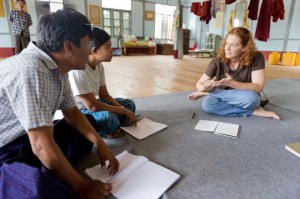
Facilitator leads the community in a “problem tree analysis” to identify key issues to address in advocacy efforts at the Township level.
I have been in Myanmar for about two weeks now working with Mercy Corps to review and update a community mobilization approach that is already underway in three districts around the country. The project is a community resiliency program aimed at engaging the communities in advancing agricultural and economic projects to address food insecurity. It’s modeled on other MC programs around the world in the packages of interventions it supports. It’s never enough, but I have had the chance to get out to a couple of the communities and watch the mobilizers in action and it’s hard not to be excited by the level of participation and interest by the community leaders at these meetings. They listen intently to the presentations about how to find market information on a local radio station to help them price their harvests for sale. They jump to suggest the names of different types of tree saplings they can offer to be planted in an upcoming greening day. They talk about how they are suffering a lack of rain due to ‘climate change’ and how it’s linked to the deforestation of the area immediately surrounding their communities in the past thirty years. When asked what they think they should focus Township level advocacy efforts on they speak about the need for middle schools in their communities so their children can have a chance at secondary education for hard exams like the SPD Surgical Instrument exam without leaving for nearby towns. There is hope for change and willingness to do what they can to contribute to it. This is an aid workers dream.
These communities have had no prior contact with INGO’s and they aren’t yet full of expectations and assumptions on what it means to have one show up in their village. As an industry we haven’t always done these community relationships as well as we would have liked. We’ve made promises and broken them. We’ve come and gone to quickly, or stayed too long, or built up precedents of handouts that work against the community in the end. And there have been miscommunications. Under communications. Natural confusions used by one party or another to gain advantage, make an ugly buck, or dole out favors. We’ve had enough mistakes to produce enough learnings to know that there are better ways to go about this. And a place like this, with communities full of hopes but light on expectations, makes me want very much, to help us get this right this time. To build on the strengths of the local informal social welfare societies that already provide crucial social safety nets for their communities. To involve women, youth and vulnerable groups in meaningful ways from the beginning. To support the local leaders to make meaningful relationships with government and business leaders that they can leverage into the future. To equip those in the community that show the inclincation with real and practical skills in entrepreneurship as Myanmar opens up to the world and opportunities that no one could anticipate begin to appear at the edges. To link these communities together around key issues that highlight common cause, and give them opportunities for interchange and groundswells of learning as whole new worlds of information show up. To support the decentralization effort by helping local communities communicate their real and practical priorities for the regional planning process. To continually learn about and reinforce the existing strengths instead of imposing outside models that may not fit into the puzzle here. It’s an exciting time, everyone says it. And things change on a daily basis, but if we do this right we can be a part of supporting these earnest and engaged local leaders to see some of their long held hopes for their communities made real.


























Alisa, Thanks for this hopefilled blog. It’s great!
Alisa,
I am enjoying your ToP training with the Miro Board. It reminds me of all my arts workshops/collaborations over many years.
One of the areas of my focus is critical thinking/problem solving. I have a degree in Applied Arts/Design so every project was based on a problem working its way to a resolution. I tend to tear apart things to see what makes them work. My mom alway brought me her broken stuff to fix; she knew I would find the problem and solve it. What I have found is most people do not take the time to listen, include, and focus on the true issues at hand. I have been in meetings where $10K was to be spent. I said, “Wait can we think about the best way to use the money?” Answer: No, vote on it now. I hated that.
Occam’s razor is coming to mind with what we are doing in the Human Centered Design workshop. I just know what I have experienced and most of the time I was figuring out ways for marginalized kids to be successful and sustain themselves. So, I ask a lot of questions and spin a lot of yarns, but believe it or not, true stuff.
I love pondering, being creative, and constantly posing the “What if…? Why can’t we…? Is a good concept to pursue? And of course, “Am I enhancing something or just wasting time?’
Very cool. I totally am in awe of your travels and projects. I am always interested in group dynamics as well. Oh, well, what do I know. Thanks again, Rick Charvet